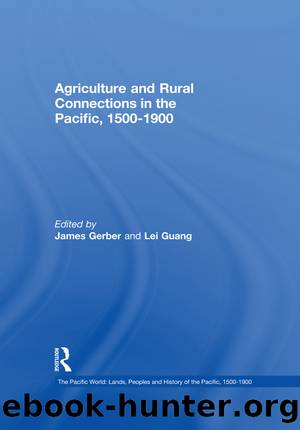Agriculture and Rural Connections in the Pacific by Lei Guang James Gerber

Author:Lei Guang, James Gerber [Lei Guang, James Gerber]
Language: eng
Format: epub
ISBN: 9781351960137
Barnesnoble:
Publisher: Taylor & Francis
Published: 2017-05-15T00:00:00+00:00
11
Chinese Settlements in Rural Southeast Asia: Unwritten Histories
Mary Somers Heidhues
Among historians, Southeast Asiaâs Overseas Chinese have never enjoyed much popularity. They are in many respects a âPeople without a Historyâ, having left behind no substantial deposit of experience and having failed to produce a school of historians to write their own history from an insiderâs perspective.1
This quotation from Leonard Blusséâs collection of studies of mestizo women and Chinese settlers in seventeenth-century Batavia certainly overstates the case, if we think of Liem Thian Joeâs history of the Chinese in Semarang,2 of the huiguan (Chinese association) histories, and of the historical sections of most studies of urban communities of Chinese, some written by Southeast Asian Chinese themselves. Jennifer Cushmanâs own work adds in various ways to our knowledge of the history of Chinese in Southeast Asia.
Blusséâs assertion is nevertheless partly justified. In China, history meant history of the achievements of the dynasty and of prominent and exemplary individuals. In Southeast Asia, traditional histories often had a strong legitimating function. In a similar way, much of recent research on ethnic Chinese in Southeast Asia is biased toward community leaders, men of wealth and property or, more rarely, those distinguished in education, writing, or public service. As a consequence, historical studies have treated revenue farmers who dealt in opium, gambling and alcohol, Kapitan, and temple-builders, memorialized in tombs and ancestral tablets.3 For the moment, cukong, industrialists, and financiers, and above all. conglomerates, seem to dominate the field.
The many biographies and autobiographies that have appeared in the past years seem to be replacing the community studies of earlier decades. Most deal, not merely with individuals, but with urban ones. Even Yen Ching-hwangâs social history of the Chinese in Singapore and Malaya emphasizes urban organizations and urban leaders.4
This bias toward urban communities is as understandable as is that toward their leadership. Chinese in Southeast Asia as a rule are not a rural people. They are more urbanized than the indigenous populations; they live, typically, in cities and in towns, not on the land. Often, where they acquired agricultural land, as in the Philippines or southern Vietnam, they were landlords, not farmers. Other Chinese, who did reside in rural areas or small market centres, may have collected and traded in primary products, but as a rule they did not produce them.
Download
This site does not store any files on its server. We only index and link to content provided by other sites. Please contact the content providers to delete copyright contents if any and email us, we'll remove relevant links or contents immediately.
| Africa | Americas |
| Arctic & Antarctica | Asia |
| Australia & Oceania | Europe |
| Middle East | Russia |
| United States | World |
| Ancient Civilizations | Military |
| Historical Study & Educational Resources |
The Sympathizer by Viet Thanh Nguyen(4384)
The Rape of Nanking by Iris Chang(4203)
World without end by Ken Follett(3474)
Ants Among Elephants by Sujatha Gidla(3460)
Blood and Sand by Alex Von Tunzelmann(3195)
Japanese Design by Patricia J. Graham(3167)
The Queen of Nothing by Holly Black(2586)
City of Djinns: a year in Delhi by William Dalrymple(2551)
Foreign Devils on the Silk Road: The Search for the Lost Treasures of Central Asia by Peter Hopkirk(2455)
India's Ancient Past by R.S. Sharma(2450)
Inglorious Empire by Shashi Tharoor(2437)
Tokyo by Rob Goss(2427)
In Order to Live: A North Korean Girl's Journey to Freedom by Yeonmi Park(2378)
Tokyo Geek's Guide: Manga, Anime, Gaming, Cosplay, Toys, Idols & More - The Ultimate Guide to Japan's Otaku Culture by Simone Gianni(2360)
India's biggest cover-up by Dhar Anuj(2350)
The Great Game: On Secret Service in High Asia by Peter Hopkirk(2335)
Goodbye Madame Butterfly(2250)
Batik by Rudolf Smend(2179)
Living Silence in Burma by Christina Fink(2067)
